Most new cars begin to lose value through depreciation as soon as they leave the forecourt. When you sell your car, you’ll probably get less than what you initially paid.
So, how can you increase your motor’s resale value? Keeping it in tip-top mechanical and cosmetic condition is key – and a few smart repairs and replacements can make a big difference.
In this guide, we’ll cover 13 ways to increase your car’s resale value with ballpark costs to help you budget effectively. Finally, we’ll run through some tips for selling your car effectively.
Quick links (By Budget):
-
Quick links (By Budget):
£0-£20: Create a compelling ad|
- £35: Gather documentation and accessories
|
- £60: Detail your car
|
- £75: Replace any worn items
|
- £80: Repair the windshield
|
- £100: Invest in a vehicle survey
|
- £135: Recharge the air con
|
- £150: Restore paintwork
|
- £200: Replace the brake pads and discs
|
- £260: Have a recent MOT and service
|
- £265: Refurbish your wheels
|
- £330: Replace your tyres
|
- £350: Add window tints
|
- Other tips for selling your car
|
Get a free valuation
How to increase the resale value of your car (In order of cost)
-
1. Create a compelling ad
With patience and perseverance, you could get more cash if you sell your car privately rather than part-exchanging at a dealership.
If you’re selling your car on the private market, listing it on a car advertising website can help you find the right buyer. You can also utilise traditional advertising channels such as community noticeboards.
Whichever method(s) you decide on, you should aim to create an appealing and informative ad. It should contain everything prospective buyers need to know to decide whether to get in touch and arrange a viewing.
Here are a few pointers to help you craft the perfect car ad:
- Avoid sensationalism, superlatives, or ‘clickbait’ tactics: A simple, descriptive title containing your car’s make, model, colour, and specification will generate a lot more enquiries than an attention-seeking headline.
- Provide as much detail as possible: When writing your ad, try to cover everything that a prospective buyer might want to know. At a minimum, you should include the mileage, age, trim details, number of previous owners - and a brief history of the vehicle’s history.
- Use high-quality photographs: Take a series of clear photographs (ideally in daylight) showing the interior and exterior of the car from every angle.
- Set your price realistically: Use our free car valuation tool to find out what your car’s worth. This will allow you to set a fair price for your car.
- Be approachable: Avoid phrases such as ‘serious offers only’, as they can make you look like a difficult seller. When you hopefully start to receive enquiries, aim to respond promptly and accommodate prospective buyers as much as you can.
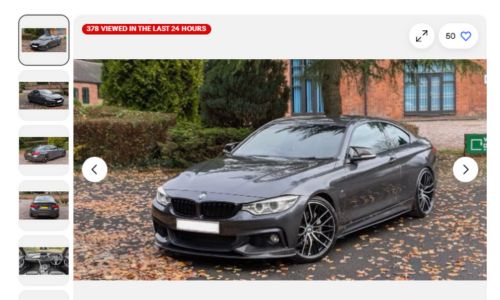
💡 You can advertise your car online, but make sure you include all essential details, use high-quality photos, set a realistic price, and create a clear, descriptive title to attract serious buyers.
Here’s a quick checklist of the details to include:
- Your car’s make, model, trim level, and engine spec.
- The number plate age identifier (e.g. ‘24’ or ‘74’ for 2024).
- The date of your last MOT - or how much MOT cover is left.
- The paint colour and finish.
- A list of features and equipment (e.g. keyless entry and DAB radio).
- You are legally obligated to disclose whether your car has been written off.
- Where you can view the car.
- Your contact details and the asking price.
Costs 💰
Many online car advertising platforms allow you to advertise free of charge. In some cases, this can be enough to help you find a suitable buyer.
However, premium online car listings tend to be more feature rich and provide more targeted advertising. So, by investing a little here, you may be able to attract more interest – and better offers for your motor.
You may pay around £20 to place a premium listing for a fortnight – or £45 for an indefinite, fully-feature ad.
If you want to explore offline channels, you may be able to advertise on a community noticeboard for free (or a nominal fee) with the permission of the property owner.
💸Typical spend: £0-£20
2. Gather documentation and accessories
To maximise your car’s resale value, you should ensure that it has the full complement of documentation.
The V5C logbook is the most important document of all. When this document is missing, many buyers will significantly reduce their offer, or back out of the sale completely. The DVLA advises against buying a car with a missing V5C logbook, as there is a higher likelihood that it has been stolen.
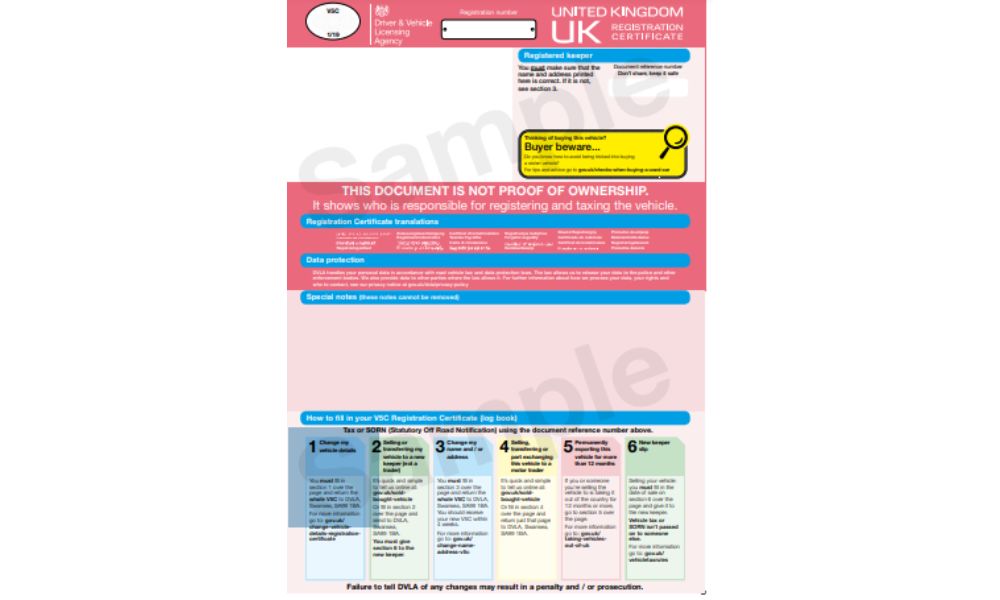
The latest version of the V5C logbook
Service history also affects car value. If you can demonstrate that your car has been serviced according to the manufacturer’s guidelines, this will reassure buyers that your motor is in good working order. Conversely, an absent service history may raise concerns that your car hasn’t been well looked after.
When selling your car, we recommend gathering the following documents:
- V5C logbook.
- Service history.
- Car parts receipts.
- Car warranty documents.
- Insurance documents.
- MOT certificates.
- Number plate retention certificate (V778) (if required).
- Owner’s manual.
- Proof of deposit and purchase receipts.
- Repair and part receipts.
You should also gather key accessories, for example:
- Both sets of keys.
- The wheel locking nut.
- The spare wheel (if applicable).
Costs 💰
Replacement car keys: The cost of replacing lost car keys can vary drastically from around £125 for a manual Ford Fiesta key, up to around £8,000 for a replacement Bentley key!
Programming new car keys: If you can find an auto locksmith with a blank key that matches your car, they can program the key to work with your motor. This typically costs between £30 and £120. Just bear in mind that your car will be worth slightly less than if it still had the manufacturer’s original key.
Replacement logbook: You can order a replacement V5C logbook through the DVLA. There is a £25 fee for this service.
Replacement documents: Many garages will charge you a nominal fee for any replacement invoices and service documents. You can print your MOT certificate at home for free.
💸Typical spend: £35 (to replace the V5C logbook and missing service paperwork)
3. Detail your car
Cleaning your car at home can certainly improve its appearance and make it more appealing to prospective car buyers.
However, if you want to replicate that showroom sheen, it’s worth investing in a professional detailing service. This is more comprehensive than a car wash or valet service.
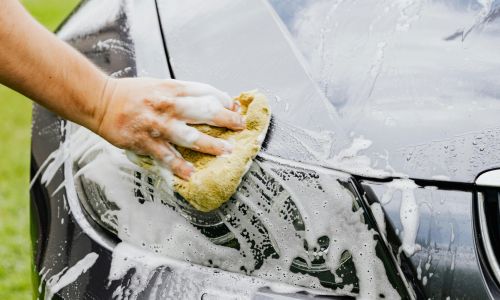
A detailing package may include:
- Hand washing the exterior, cleaning the wheels and tyres – and removing contaminants.
- Polishing, buffing, and waxing the exterior paintwork, plastics, and trim.
- Vacuuming the interior, including areas that are difficult to reach for home car cleaners.
- Leather upholstery treatments (if applicable).
- Interior shampooing and steam cleaning.
- Glass cleaning to provide clear visibility and a streak-free finish for windows and mirrors.
Costs 💰
The cost of having your car detailed will vary depending on your choice of provider and detailing package:
- Basic packages, which typically comprise a simple interior clean and exterior wash usually cost £35 to £60.
- A more premium service, including a comprehensive interior and exterior clean may cost in the region of £250 to £500.
💸Typical spend: £60
4. Replace any worn items
Many items and fixtures can become worn over time, making your car look tired. Replacements for most car items, including wiper blades, headlight bulbs, floor mats and badges can be sourced cheaply and easily online.
You may be surprised by the sheer difference a few well-placed replacements can make to your car’s value.
Costs 💰
- Wiper blades (full set): £12 to £30
- Rear wiper blades only: £5 to £17
- Headlight bulbs: £3 each
- Floor mats: £10 to £100
- Badges: £6 to £250+
💸Typical spend: Full set of wiper blades and floor mats - £75
5. Repair the windshield
Aside from hurting your car’s aesthetics and reducing its resale value, a damaged windscreen can put you and your passengers in danger:

Windscreen scratches:
- Surface-level marks caused by worn wiper blades can compromise visibility.
- Deeper scratches may make the windscreen irreparable.
Windscreen chips:
- Caused by road debris, hailstones, birds, or stray objects like golf balls.
- Prompt repair is recommended; many insurers cover free chip repairs.
- Chips over 40mm or in the driver’s critical vision area ('Zone A') render the vehicle unroadworthy.
Windscreen cracks:
- Obstruct vision, worsen glare, and make the car illegal to drive.
- Cracked windscreens significantly hinder car resale prospects.
Costs 💰
- Windscreen scratch repairs: Typically cost between £120 and £250 per arc (depending on the type of window).
- Side glass scratches: Typically costs around £120 to remove.
- Chipped windscreen repair: Typically costs between £40 and £118.
- Windscreen replacement: If your windscreen needs to be replaced, you may pay around £220 for a basic car - and £2,000 or more for a luxury model.
Please note: You may be able to get these repairs for free, if your insurance covers this. (Some providers will charge you a small excess.)
💸Typical spend: £80 (to repair a chipped windscreen)
6. Invest in a vehicle survey
A vehicle survey or pre-purchase car inspection is a detailed examination carried out by an independent mechanic. This usually involves a comprehensive inspection of your vehicle’s mechanical, structural, electrical, and cosmetic health – along with a vehicle history check.
A comprehensive vehicle survey can highlight hidden issues, build buyer trust, justify your asking price, speed up the sale, save buyers hassle, and act as a valuable marketing tool to attract serious offers.
Costs 💰
The cost of a pre-purchase inspection in the UK can range from around £50 for a basic package to around £270 for a more comprehensive inspection.
💸Typical spend: £100
7. Recharge the air con
Air conditioning systems lose their effectiveness over time, because they use gas to cool the air they pump out.
Without a working air conditioning system, summer drives will be less enjoyable – and you’ll spend longer demisting your windows on those colder days. Faulty air conditioning will also hurt your car’s resale value and deter many prospective buyers, as this is a feature that many can’t live without!
To resolve this issue, you’ll need to have your air-conditioning system recharged (or regassed) at a trusted local garage.
Many manufacturers recommend having your air-conditioning system regassed every two years. However, you may need to do this more often if you use it very regularly.
Costs 💰
Air-conditioning systems in most UK-registered cars feature one of two types of refrigerants:
- R134A (commonly found in vehicles manufactured before 2014).
- R1234YF (used in all air-conditioned vehicles manufactured from 1st January 2017).
It typically costs around £70 to recharge a R134A air conditioning system – or around £135 for an R1234YF model.
💸Typical spend: £135 (based on professionally recharging a R1234YF air-conditioning system).
8. Restore paintwork
Your car’s paintwork goes through a lot. Over time, it can be damaged by a variety of factors, including sunlight, road debris, bird droppings, road salt - and improper cleaning and waxing. Swirl marks may also be caused by the brushes at machine car washes.
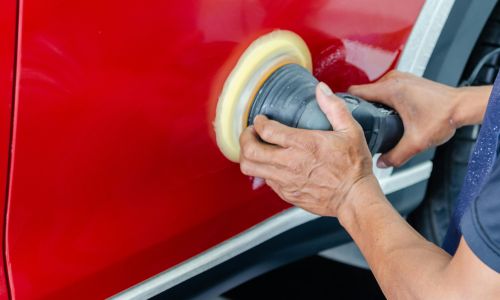
Costs 💰
- Household solutions cost virtually nothing.
- Home scratch repair kits cost from £4 to £58.
The cost of having a car scratch repaired professionally will vary depending on factors such as:
- The size and extent of the damage.
- The type of paint required.
- The amount of prep work required.
- Local labour rates.
Here are some ballpark costs for professional car scratch repair in the UK:
Repair type Low range High range Average cost Lighter surface scratch repair £70 £110 £90 Paintwork damage scratch repair £120 £180 £150 Deeper paintwork scratch repair £270 £330 £330 💸Typical spend: £150 (professional pairs for moderate paintwork damage)
9. Replace the brake pads and discs
Brake safety is bound to be at the top of potential car buyers’ wishlists - especially when replacing them can be so costly.
If your brakes are worn, having your brake pads and discs replaced can be a sound investment and will increase your car’s resale value in most cases. The next owner will appreciate the reassurance that they won’t need to pay for brake replacement anytime soon!
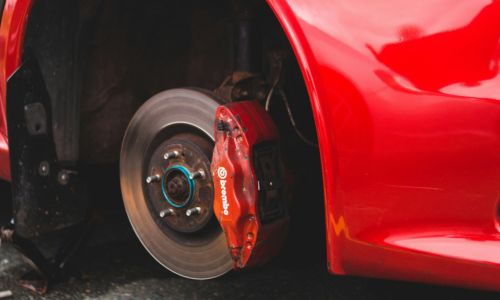
Although you can replace either brake pads or brake discs individually, it’s advisable to replace both together. The brake pads and discs work together to ensure your car can stop safely.
Replacing one without the other could cause uneven braking – and potentially damage the newly-fitted components. What’s more braking performance could still be compromised.
Costs 💰
As a general rule, the larger your car’s engine is, the more you’re likely to pay for brake pad and disc replacement:
Engine size
Ballpark replacement cost
Up to 1300cc
£185
Up to 1600cc
£200
Up to 1900cc
£210
Up to 2200cc
£225
Over 2200cc
£235💸Typical spend: £200
10. Have a recent MOT and service
If your car has less than 6 months’ MOT cover remaining, getting it re-tested before selling your car can boost its value. The next owner will be reassured that the car has no major mechanical issues – and you will also spare them the hassle and expense of getting another MOT test in the immediate future.
Similarly, if your car's next service is due within 6 months, getting this done before selling will spare the buyer another immediate expense. A recently serviced car is also less likely to require routine maintenance such as oil changes and filter replacements – something that’s likely to be at the forefront of car buyers’ minds.
If you plan to sell your car privately, don’t forget to mention your car’s recent service and MOT in your ads.
Costs 💰
The maximum cost for an MOT in the UK is £54.85, but pricing varies and tends to be highest in urban areas.
Average costs for car servicing in the UK are as follows:
- Interim service: £110
- Full service: £170 (small car)
- £210 (medium-sized car)
- £395 (large car)
- Major service: £210
💸Typical cost for an MOT and full service for a medium-sized car: £260
11. Refurbish your wheels
Scratched or damaged alloys or hubcaps can detract from the appeal of any car – and some buyers may try to use this to knock your price down. Addressing these concerns before selling your car can restore some of its resale value.
Some garages offer alloy wheel refurbishment, which involves cleaning, repairing, priming, and finally, repainting the wheels.
If you have steel wheels with hubcaps that are cracked or damaged, you should be able to source suitable replacements to improve their appearance.
Costs 💰
Typical wheel refurbishment costs (excluding labour costs) are as follows:
- Refurbishing a single alloy wheel: £50 to £120.
- Dry powder coating: £40 to £100 per wheel.
- Diamond cutting: £85+ per wheel.
- Replacement alloy wheels: £50 to £1,000+ per wheel (depending on size and specification).
- Hubcaps for steel wheels: £25 to £60 each.
💸Typical spend: £265 for 4x replacement hubcaps - or £340 for 4x diamond cut alloy repair
12. Replace your tyres
The minimum legal tyre tread is 1.6mm. However, studies have shown that tyres worn below 3mm compromise braking distances.
If your tyres are worn below 4mm, you should replace them before selling your car to spare the hassle and expense for the next owner. Fresh tyres can improve your motor’s appearance, safety, performance, fuel efficiency - and resale value.
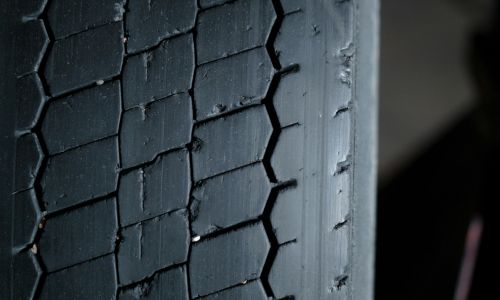
Costs 💰
- Costs for a single new tyre can vary significantly. A budget tyre typically costs around £50, while a premium brand tyre may cost around £115.
- If you’re investing in a full set of new tyres, you may spend between £200 and £460 depending on your choice.
- Part-worn tyres are cheaper, with prices ranging from as little as £10 to around £80.
- However, we advise against swapping your tyres with part-worn alternatives, as they will add little value to your car. What’s more, they may have hidden damage, meaning the risk of punctures and blowouts is greatly increased.
💸Typical spend: £330 for a full set of new tyres
13. Add window tints
Tinted windows can enhance your car's style and provide protection from heat and UV rays, potentially increasing its resale value. However, not all buyers will appreciate tinted windows, with some seeing them as a bonus while others might be deterred. To boost your car’s value legally, ensure the tint complies with regulations: for cars first used after 1st April 1985, the front windscreen must allow at least 75% of light through, and the front side windows 70%; for older vehicles, both must allow 70% of light through.
Costs 💰
Here are some ballpark costs for professional window tinting:
Lower end
Higher end
Average
Car window tinting
£200
£500
£350Costs usually range from around £200 to £500, but may be higher in some cases, particularly for electric window tinting.
Pre-cut DIY window tint kits cost around £20 and are available for the most popular car models.
We only recommend attempting DIY window tinting if you are confident carrying out the steps above. Otherwise, it’s a job best left to a professional.
💸Typical spend: £350 for a mid-priced professional tint
Tips for selling your car
In this section, we’ll share some valuable tips and concepts to help you sell your car like a pro. From choosing the right moment to sell to budgeting and hiring a reputable mechanic, we’ll cover everything you need to know.
-
1. Selling your car at the right time
Preparing your motor for sale is not the only consideration. When you sell your car, can also influence its resale value. Here are a few key points to consider:
Resale values of cars fluctuate throughout the year due to seasonality, with convertibles reaching their peak in spring and summer, while SUVs, 4x4s, and MPVs perform best in autumn and winter when the weather suits their capabilities. Regularly valuing your car using tools such as webuyanycar's free valuation service can help you monitor changes and determine the ideal time to sell. Market factors like rising inflation and fuel prices can also affect resale values significantly. Fuel-efficient cars typically achieve higher prices when fuel costs are high, whereas larger, less economical vehicles are best sold when fuel prices are lower, and demand has stabilised.
-
2. What causes a car to increase in value?
- Increased demand - When economic factors lead to a rise in demand for used cars, you can also expect their resale values to increase.
- Rarity and collectability - Most cars will continue to depreciate as they age. However, this isn’t the case for certain desirable classic cars. These sought-after models can reverse the trend and gain value thanks to interest from car enthusiasts and collectors.
- Upgrades and modifications - Investing in certain upgrades and modifications can boost your car’s value such as remapping or replacing car tyres, wheels and brakes.
-
3. What causes a car to decrease in value?
- Age: Cars depreciate over time, with the steepest loss in the first year. Depreciation slows around 8-10 years.
- High mileage: Mileage affects value, cars with over 10,000 miles annually are considered high mileage. Values drop further after 70,000 miles and significantly past 100,000 miles.
- Poor condition: Scratches, dents, rust, and other cosmetic damage reduce a car’s value.
- Mechanical issues: Performance problems, concerning noises, and engine faults can heavily impact value.
- Write-off status: Cars written off lose value, with Category N write-offs typically losing 20-40%. Category B cars can be salvaged for parts, while Category A cars must be scrapped. Selling without disclosing write-off history is illegal.
- Aftermarket enhancements: Modifications like loud exhausts, novelty horns, or poorly executed upgrades often reduce a car’s appeal and value.
-
4. Setting your budget
Before investing in any repairs or enhancements, work out how much you can feasibly spend:
- To work out your car’s current value, we recommend getting a quote using our free car valuation tool. Remember to declare any damage or faults to ensure your valuation is as accurate as possible.
- From here, you can work out how much value you could gain by restoring your car by getting a fresh valuation without declaring damage.
- Remember, any cash you spend on preparing your motor for resale will eat into your profits. Therefore, it’s important to set a clear budget.
-
5. Deal with outstanding finance and negative equity
If your car has outstanding finance, the balance must be settled before you can legally sell the car.
Some car buying services including webuyanycar can settle the finance on your behalf to enable a quick, hassle-free sale. You’ll just have to obtain a settlement letter from the lender.
However, if you intend to sell your car privately, you’ll need to settle the balance yourself by completing the rest of your regular payments or paying the full amount in a lump sum.
-
6. Seek a professional opinion
If you plan to invest in repairs, consult a reputable local mechanic and ask for a breakdown of the work needed. At this stage, you can decide whether it’s better to invest in repairs or sell your motor in its current condition.
-
7. Invest in mechanical and cosmetic fixes
When choosing a mechanic or detailing service to carry out the work, pay attention to online reviews on platforms such as Google Maps, Trustpilot, and Yelp. Make sure you fully understand the cost, agreed work, and timescale before committing.
If you're looking for more tips like this, see our more detailed and updated tips for selling your car page.
Sell your car in a under an hour
webuyanycar offers a simple alternative for car owners who want to skip the hassle of a private sale. Here’s how it works:
- Enter your reg number into our free car valuation tool and get a quote in under 30 seconds.
- Book your appointment at any of our 500+ UK branches.
- Drive to your appointment. If you’re happy to sell, we’ll help with the paperwork and send the cash to your bank.


